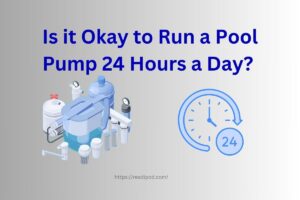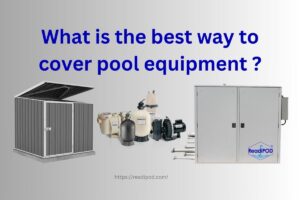Is your pool pump making loud or unusual noises? While it’s normal for a pool pump to hum during operation, loud sounds like grinding, rattling, or screeching can signal a problem. These noises not only disturb the peace around your pool but might also mean something is wrong with your pump that could lead to expensive repairs if ignored.
Your pool pump plays a vital role in keeping the water clean and healthy. When it starts making loud sounds, it’s often a sign of issues like blockages, loose parts, or worn-out components. Ignoring these problems can make them worse, reducing the pump’s efficiency and lifespan.
The good news is that many of these issues can be fixed with simple checks and maintenance. In this guide, we’ll explain the common reasons for a noisy pool pump, show you how to troubleshoot the problem, and share tips to keep your pump running smoothly and quietly.
Common Reasons for Loud Pool Pumps
If your pool pump is making loud noises, there are several common reasons that could be causing the issue. Understanding these will help you identify the problem and take action to fix it.
1. Cavitation
Cavitation happens when there isn’t enough water flowing through the pump, causing air bubbles to form and collapse inside the system. This creates a loud, rattling noise.
- Cause: Clogged filters, closed valves, or low water levels.
- Solution: Clean the filter, ensure the skimmer basket is clear, and check that the water level is correct.
2. Blocked or Dirty Impeller
The impeller is the part of the pump that helps move water. When it gets clogged with debris like leaves or dirt, it can make a grinding or clogging noise.
- Cause: Debris buildup inside the impeller.
- Solution: Turn off the pump, remove the debris, and clean the impeller.
3. Worn Bearings
Bearings help the motor run smoothly. Over time, they can wear out and start making a high-pitched screeching or grinding noise.
- Cause: Worn or damaged bearings in the motor.
- Solution: Bearings should be replaced by a professional if damaged.
4. Loose or Vibrating Parts
If parts of the pump, like bolts or housing, are loose, they can vibrate and cause rattling or clanking noises.
- Cause: Loose parts or improper installation.
- Solution: Tighten all bolts and ensure the pump is installed securely.
5. Air in the System
Air trapped in the pump can cause it to make strange noises, especially when there’s a leak in the suction lines.
- Cause: Leaks or loose connections in the suction lines.
- Solution: Check the suction lines for leaks and seal any loose connections.
6. Motor Issues
The motor is responsible for powering the pump. If there’s a problem with the motor, like worn-out windings or electrical issues, it can produce buzzing, humming, or whining sounds.
- Cause: Faulty motor components or electrical problems.
- Solution: Have the motor checked and repaired or replaced by a professional if needed.
Troubleshooting Steps for a Noisy Pool Pump
If your pool pump is making unwanted noise, it’s important to troubleshoot the issue to figure out what’s going wrong. Here’s a step-by-step guide to help you identify the problem and fix it before it leads to more damage.
Step 1: Turn Off the Pump
Before doing anything, make sure the pump is completely powered off. This ensures your safety and prevents further damage to the system while you inspect it.
Step 2: Check for Debris
One of the most common causes of a noisy pump is debris clogging the system. Debris can get stuck in the skimmer basket, pump basket, or the impeller.
- What to do: Inspect the skimmer and pump baskets for any debris such as leaves or twigs. Also, check the impeller (the rotating part of the pump that moves the water) for any blockages.
Step 3: Inspect for Loose Parts
Loose parts can cause a rattling or clanking sound. These could be bolts, screws, or even the pump housing itself.
- What to do: Tighten any loose bolts or fasteners on the pump. If the pump is mounted on a surface, ensure its securely positioned.
Step 4: Check the Water Level
Low water levels can cause the pump to struggle and create loud noises.
- What to do: Check the water level in your pool. If it’s too low, the pump might start drawing in air, causing cavitation or other issues. Make sure the water level is at the manufacturer’s recommended height.
Step 5: Inspect for Leaks
Leaks in the suction or return lines can cause air to enter the system, leading to a noisy pump.
- What to do: Inspect all the suction lines and connections for leaks. If you find any, tighten the connections or replace the seals.
Step 6: Listen for Motor Noises
If the noise is coming from the motor, it could be a sign of worn bearings or electrical issues.
- What to do: If the noise seems to be coming from the motor, it may need to be checked by a professional. Worn bearings will need to be replaced, and electrical problems may require a qualified technician.
Step 7: Check the Pump for Cavitation
Cavitation can occur if there’s insufficient water flow through the pump. This causes air bubbles to form inside the system, creating a loud, grinding sound.
- What to do: Make sure the filters and valves are clean and fully open. If you have low water levels, top up your pool to ensure the pump has enough water to circulate.
Preventive Measures to Keep Your Pool Pump Quiet
- Clean the Pump Basket and Skimmer Regularly – Remove debris like leaves and dirt to ensure proper water flow and prevent clogs
- Clean and Maintain the Filter – Clean or backwash the filter regularly to avoid poor water flow that can cause noise
- Check for Leaks – Inspect hoses, pump, and plumbing for leaks and seal any gaps to prevent air from entering the system
- Maintain Proper Water Level – Keep the pool’s water level high enough to avoid air entering the pump and causing cavitation
- Clean the Impeller – Periodically check the impeller for debris and clean it to prevent grinding sounds and ensure smooth operation
- Ensure Proper Pump Alignment – Make sure the pump is securely mounted and aligned to avoid vibrations and rattling
- Regularly Service the Motor – Clean the motor and have it professionally serviced if you hear unusual sounds, or it overheats
- Consider a Quieter Pump Model – Upgrade to a modern, variable-speed pump that operates more quietly and efficiently
Considering a Quieter Pump Option for Your Pool?
Upgrading to a quieter pool pump can make a big difference in the peace and quiet around your pool. A variable speed pump is a great option, as it adjusts its speed based on the needs of your pool. This means it runs at lower speeds when full power isn’t needed, making it much quieter and more energy efficient. Another choice is an energy efficient pump, which reduces noise by operating with less vibration. For the quietest operation, you can investigate low noise pumps, which are specifically designed to minimize sound. The way your pump is installed also matters. Installing it in a soundproof enclosure can help reduce noise, especially if it’s close to living areas. Also, choosing the right pump size ensures your pump works smoothly and quietly without using more power than needed. For a simple solution that combines quiet operation and easy setup, ReadiPOD offers a compact pool system with pre-configured, quieter pumps that make maintaining your pool effortless and peaceful.
Conclusion
If your pool pump is making a loud sound, it’s important to identify the cause and take action to prevent further damage. Common issues like air in the system, debris buildup, or a clogged filter can often be resolved with simple maintenance. However, more serious problems like cavitation or pump motor issues may require professional attention. Regular cleaning, maintenance, and the right pump installation can help keep your pump running smoothly and quietly. If you’re still facing noise issues, upgrading to a quieter System, like the ones offered by ReadiPOD, could be the perfect solution for a peaceful pool experience. Addressing the problem early will help extend the life of your pool equipment and ensure you enjoy a quieter, more efficient pool.





